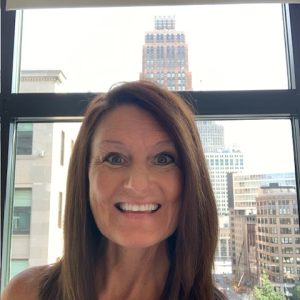The concept of refill shops, or “refilleries,” is gaining traction in Metro Detroit, driven bycommunity engagement, environmental consciousness, and a desire to reduce plastic waste. These small businesses offer an alternative way for consumers to purchase household goods, food, and other essentials, focusing on refilling containers rather than buying new packaging. Three local refillery owners – Corey Thompson of Red Oak Refillery, Jessica Cichowlas of BYOC, and Ashby Cummings of MI-Fillosophy – are leading the charge to bring sustainable, zero-waste shopping practices to the area.
Corey Thompson, founder of Red Oak Refillery, began her journey toward a refill-centered business model while working at Mama Suds, a brand specializing in natural household cleaners. “About 30% of our wholesale sales at Mama Suds were to refilleries, mostly on the East and West Coasts,” Thompson explains.
Seeing the potential, and nudged along by Mama Suds founder and long-time friend Michelle Smith, she launched Red Oak Refillery as a pop-up in 2021. Setting up shop part-time in a Lake Orion coffeehouse, Thompson’s goal was to test and refine her model, making refilling accessible without requiring a full storefront.
“Instead of going the traditional brick-and-mortar route, I opted for a distributed model with installations in businesses that align with my values,” she says. Today, Thompson operates out of two locations and is planning a third, all while continuing her work with Mama Suds.

MI-FILLOSOPHY
For Jessica Cichowlas, the motivation to run a refillery was personal. “I was a customer at BYOC, and the mission of reducing single-use plastic really resonated with me,” she shares. When the opportunity arose to purchase the business, Cichowlas jumped at it, taking over two locations in Ann Arbor and Plymouth.
Her vision is to support local and family-run businesses that are committed to sustainability, reflecting BYOC’s core values. “I want to continue the mission of reducing plastic and focus on sourcing from businesses that share our environmental responsibility,” she said.
Cichowlas has seen strong community support, especially in Ann Arbor, a city committed to achieving carbon neutrality by 2030. “The mission really resonates there,” she says, adding that the Plymouth community is also beginning to embrace zero-waste practices.
Ashby Cummings, founder of MI-Fillosophy, took a slightly different route by focusing primarily on food refills. “I noticed a gap in the market for bulk food options, especially after so many bulk stores shut down during the pandemic,” Cummings explains. Launched in early 2023, MI-Fillosophy offers an alternative for consumers seeking to purchase food sustainably, in just the quantities they need. “Many customers love the option of purchasing smaller amounts to avoid waste,” she says.
Her shop has attracted visitors from across metro Detroit, and while more refill shops are opening, she believes that the convenience and environmental impact of shopping locally are essential.
The community response to these refill shops has been overwhelmingly positive, with each founder noting a shift in public interest toward sustainable shopping practices.
“For some people, the idea of a refillery is new and intriguing, though it’s been common in other countries for years,” Thompson says. She sees refill shops as natural hubs for community education and sustainability outreach, explaining that residents have reached out to her for collaborations, such as helping local schools achieve Green Schools Program certification.

RED OAK REFILLERY AT OAKLAND UNCORKED
“It’s amazing to see the community embrace this concept and look to refill shops for guidance on sustainable living,” she says.
Cichowlas also points out the educational role refill shops play. “Refill shops have a responsibility to educate the community,” she says. “Zero-waste living can feel intimidating. By offering advice and carefully curated products, we can remove some of the guesswork.”
Cummings echoes this sentiment, noting that MI-Fillosophy has brought sustainability into the spotlight for her customers.
“Every day, we answer questions about recycling and choosing eco-friendly products,” she says. By providing a space where people can learn and practice sustainable habits, Cummings believes refill shops are helping shift community norms around waste reduction.
Running a refill shop, however, is not without its challenges. Thompson points out that, as a relatively new industry, refill shops face many of the typical startup hurdles, along with the added task of educating the public.
“There’s a constant need to explain the refill concept and show people how it works,” she says.
For Cichowlas, the primary obstacle is keeping costs competitive with larger retail chains while maintaining a commitment to local sourcing and sustainability. “We don’t have the same economies of scale, so pricing can be tricky,” she explains.
Cummings, faces unique challenges related to food safety. “Managing expiration dates and recalls is a big part of what we do,” she says. “There’s also an educational aspect because some people aren’t familiar with bulk food safety.”
These refilleries are not only helping individuals reduce their carbon footprint but are also influencing the broader community’s environmental impact.
“Just using a container twice can make a big difference,” says Thompson.
Cichowlas tracks the number of containers BYOC has saved from landfills saying it’s roughly 58,000 as of July 31.
“We want our customers to see that their choices make a difference,” she says.

BYOC
Product selection also plays a critical role in each store’s sustainability efforts.
Thompson adheres to three key criteria: products must be made in Michigan, come from women-owned businesses when possible, and be as green, clean, and sustainable as possible.
“I want every product to reflect our environmental values,” she says.
Cichowlas and Cummings also prioritize local sourcing, supporting family-run businesses, and using sustainable packaging.
“We even have a ‘Made in Michigan’ section where local vendors’ values align with ours,” says Cummings.
Looking ahead, each founder sees a bright future for refill shops, with growing consumer interest and a shift toward reuse rather than recycling.
“I believe the future lies in digital refilling and more convenient methods,” says Thompson.
“People want to reduce their waste but also need practical solutions,” says Chchowlas.
Cummings adds, “I think refill shops will continue to grow as people see that sustainable shopping is easier than they might think.”
As always, be sure to subscribe to our newsletter for regular updates on all things Detroit.






















